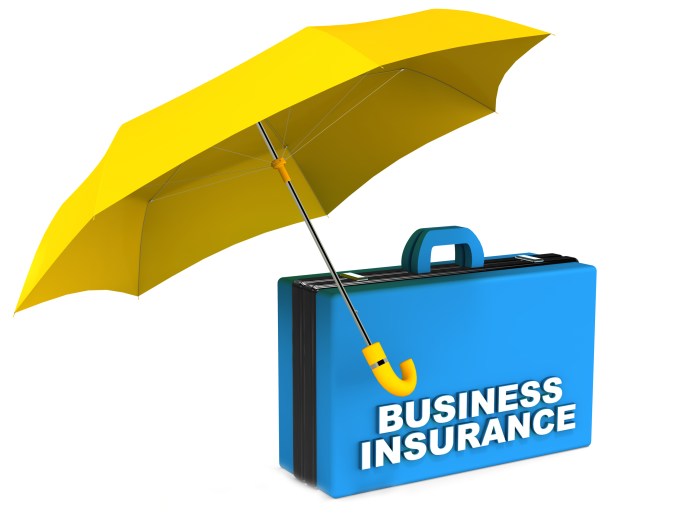
Diving into the realm of business insurance, this introduction aims to provide a detailed overview of this essential aspect of running a business. From understanding the significance of insurance to navigating through different coverage options, this guide will equip you with the knowledge needed to protect your business effectively.
In the following sections, we will explore the various types of business insurance, factors to consider when choosing the right coverage, costs involved, the claims process, legal requirements, and the myriad benefits that come with having robust insurance for your business.
Overview of Business Insurance

Business insurance refers to a type of insurance coverage specifically designed to protect businesses from potential financial losses due to unforeseen circumstances. It helps mitigate risks and provides a safety net for companies in case of accidents, lawsuits, property damage, or other unexpected events.
Importance of Having Business Insurance
Having business insurance is crucial for safeguarding your company's assets and ensuring its long-term sustainability. Here are some key reasons why business insurance is essential:
- Protection against financial losses: Business insurance helps cover the costs associated with property damage, liability claims, or business interruptions.
- Legal compliance: Certain types of business insurance, such as workers' compensation or commercial auto insurance, are required by law in many jurisdictions.
- Building trust with stakeholders: Having adequate insurance coverage can instill confidence in customers, investors, and partners, showing that your business is prepared for unexpected events.
Common Types of Business Insurance Coverage
There are various types of business insurance policies available to address different risks that companies may face. Here are some common types of business insurance coverage:
- General Liability Insurance: Protects businesses from third-party claims of bodily injury, property damage, or advertising injury.
- Property Insurance: Covers damage to a business's property, including buildings, equipment, inventory, and furniture, due to fire, theft, or other covered perils.
- Workers' Compensation Insurance: Provides benefits to employees who are injured or become ill while on the job, covering medical expenses and lost wages.
- Professional Liability Insurance: Also known as Errors and Omissions (E&O) insurance, it protects professionals from claims of negligence or inadequate work.
- Commercial Auto Insurance: Covers vehicles used for business purposes, including cars, trucks, and vans, in case of accidents or damage.
Types of Business Insurance

Business insurance policies can be broadly categorized into several main types to protect different aspects of a business. Let's explore the specific types within each category and understand the differences between general liability insurance and professional liability insurance.
Property Insurance
Property insurance covers damage or loss to physical assets owned by a business, such as buildings, equipment, and inventory.
- Building insurance
- Equipment breakdown insurance
- Business interruption insurance
Liability Insurance
Liability insurance protects businesses from legal claims due to injuries, accidents, or negligence that occur on their premises or as a result of their products or services.
- General liability insurance
- Product liability insurance
- Professional liability insurance
Differences between General Liability Insurance and Professional Liability Insurance
General liability insurance typically covers claims of bodily injury, property damage, and advertising injury. Professional liability insurance, also known as errors and omissions insurance, specifically covers claims of negligence related to professional services provided.
Factors to Consider When Choosing Business Insurance
When selecting insurance coverage for your business, there are several key factors that need to be taken into consideration to ensure adequate protection. These factors include the size and nature of your business, as well as a thorough risk assessment to determine suitable coverage.
Size and Nature of Business
The size and nature of your business play a crucial role in determining the type and amount of insurance coverage needed. A small business with fewer employees and lower revenue may require different coverage compared to a larger corporation with multiple locations and higher risks.
Understanding the unique aspects of your business will help tailor the insurance policy to meet specific needs.
Risk Assessment
Conducting a thorough risk assessment is essential in identifying potential threats and vulnerabilities that your business may face. By evaluating various risks such as property damage, liability claims, or business interruption, you can assess the likelihood and impact of these risks on your operations.
This assessment will help in determining the appropriate coverage needed to mitigate potential losses and protect your business assets.
Cost of Business Insurance
When it comes to business insurance, the cost is a crucial factor that every business owner needs to consider. Understanding how insurance premiums are calculated and what factors can influence the cost can help businesses make informed decisions to protect their assets.
How Insurance Premiums are Calculated
Insurance premiums for businesses are calculated based on various factors that assess the level of risk associated with insuring the business. Insurers take into account factors such as the type of business, location, size, revenue, claims history, and coverage needs to determine the premium amount.
Factors Influencing the Cost of Business Insurance
- The type of business: Certain industries are considered riskier than others, leading to higher premiums.
- Business location: Businesses located in high-crime areas or regions prone to natural disasters may face higher insurance costs.
- Claims history: A history of frequent or costly claims can result in higher premiums.
- Coverage limits and deductibles: Opting for higher coverage limits or lower deductibles can increase insurance costs.
- Employee count: The number of employees can impact the cost of workers' compensation insurance.
Tips to Reduce Insurance Costs for Businesses
- Shop around: Compare quotes from multiple insurers to find the best coverage at competitive rates.
- Implement risk management practices: Minimize risks in the workplace to reduce the likelihood of claims and lower premiums.
- Bundle policies: Consider bundling multiple insurance policies with the same insurer for potential discounts.
- Review coverage annually: Regularly review your coverage needs to ensure you are not overpaying for unnecessary coverage.
- Consider higher deductibles: Opting for higher deductibles can lower premiums, but make sure you can afford the out-of-pocket costs in case of a claim.
Claims Process in Business Insurance
When a business needs to file an insurance claim, there is a typical process that they go through to ensure they receive the coverage they are entitled to. It is important for businesses to understand what is required of them during the claims process to avoid any delays or complications.
Filing a Claim
- Notify the insurance company: The first step is to inform your insurance provider about the incident that led to the claim. This should be done as soon as possible to initiate the process.
- Gather documentation: Businesses should prepare all relevant documentation to support their claim, such as incident reports, photos, receipts, and any other evidence related to the claim.
- Cooperate with investigation: The insurance company may conduct an investigation to assess the validity of the claim. Businesses should cooperate and provide any additional information requested.
Challenges in the Claims Process
- Delays in processing: Sometimes, insurance companies may take longer than expected to process a claim, leading to delays in receiving compensation.
- Disputes over coverage: There can be disputes between the business and the insurance company regarding the extent of coverage provided under the policy, which can prolong the claims process.
- Inadequate documentation: If businesses fail to provide sufficient documentation to support their claim, it can result in the claim being denied or delayed.
Legal Requirements and Compliance

In order to operate legally, businesses in various industries are required to have specific types of insurance coverage. Failure to comply with these legal requirements can result in severe consequences for businesses.
Insurance Requirements by Industry
- Construction Industry: Construction companies are typically required to have liability insurance to protect against accidents and injuries on job sites.
- Healthcare Industry: Healthcare providers are often mandated to have malpractice insurance to cover potential medical errors.
- Automotive Industry: Auto dealerships and repair shops must have garage liability insurance to protect against damages and injuries related to vehicles.
Location-Based Compliance
- State Regulations: Insurance requirements can vary by state, so businesses must ensure they are compliant with the specific regulations in their location.
- International Operations: Companies operating in multiple countries must adhere to insurance regulations in each jurisdiction to remain in compliance.
Consequences of Non-Compliance
- Fines and Penalties: Businesses that fail to meet insurance requirements may face fines or penalties from regulatory authorities.
- Lawsuits: Without proper insurance coverage, companies are at risk of facing costly lawsuits in the event of accidents or other incidents.
- Business Closure: In extreme cases, non-compliant businesses may be forced to shut down operations until they obtain the necessary insurance coverage.
Benefits of Business Insurance
Having robust insurance coverage for businesses comes with a range of advantages. One of the key benefits is the protection it provides against financial losses, which can be devastating for a business.
Protection Against Property Damage
Business insurance can protect your company from financial losses due to property damage caused by events such as fire, theft, or natural disasters.
Liability Coverage
Insurance can also provide liability coverage, protecting your business from legal claims and lawsuits that could result in significant financial losses.
Business Interruption Coverage
In the event of a disaster or unexpected event that forces your business to close temporarily, business interruption coverage can help cover lost income and ongoing expenses.
Employee Protection
Insurance can also provide coverage for your employees, offering protection in case of work-related injuries or illnesses.
Peace of Mind
Lastly, having business insurance can provide you with peace of mind, knowing that your business is protected against unforeseen events that could threaten its financial stability.
Conclusion
In conclusion, business insurance is a crucial investment that can safeguard your business from unforeseen risks and potential financial losses. By understanding the nuances of insurance coverage and staying compliant with legal requirements, businesses can thrive with confidence in a volatile market landscape.
FAQ Corner
What does business insurance cover?
Business insurance typically covers property damage, liability risks, and employee-related risks, among other things.
How is the cost of business insurance determined?
The cost of business insurance is calculated based on factors such as the type of coverage needed, the size of the business, its location, and the level of risk associated with the business operations.
What are the consequences of not having business insurance?
Without business insurance, companies may face financial ruin in the event of a lawsuit, property damage, or other unforeseen circumstances. It can also lead to legal penalties and business closure in some cases.













